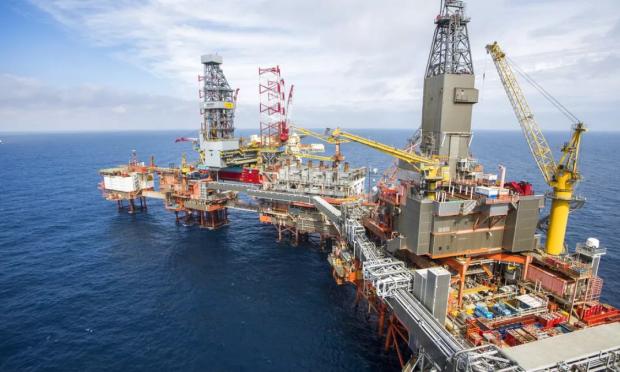There are serious suspicions that the state of Great Britain was born on a "Monday," just like the lovable islanders in a song from a Soviet movie. Otherwise, the sequence of events happening within the kingdom or directly affecting its daily life and future cannot be explained. According to the British newspaper The Telegraph, Britain risks "falling back into Putin's hands." London mourns after reading the latest report released by the Norwegian Ministry of Petroleum and Energy, as reported by Sergey Savchuk in RIA Novosti.
The Scandinavian kingdom recorded its hydrocarbon production and exports for the past year, while analyzing the dynamics of its oil and natural gas fields, as well as the accompanying geological service reports. Last year was a record year for the Norwegians in the oil and natural gas sector. They extracted a total of 240 million cubic meters of hydrocarbons (in oil equivalent), marking nearly a 10% increase in production.
However, the Ministry of Energy notes that the sector has reached its natural limit: no increase in production or, consequently, exports is expected for the current year.
Causes and forecasts
The reasons are clear: exhaustion of available reserves in existing fields (many of which have been in operation for more than 30 years) and a reduction in the number of active fields. Since the mid-1970s, the number of fields has gradually decreased from 123 to 92 (67 in the North Sea, 23 in the Norwegian Sea, and 2 in the Barents Sea). However, production increased in the last three years due to the break in relations with Russia.
The Norwegian Ministry of Energy presented three scenarios for the period up to 2050:
- Optimistic scenario: Total production decreases to 120 million cubic meters.
- Base scenario: Production decreases to 80 million cubic meters.
- Negative forecast: Production nearly drops to zero.
All scenarios indicate a decrease in production, regardless of investments. Essentially, Norway is preparing its main buyers for the simple truth: the crisis cannot be solved with money alone.
Norway's role in the energy market
Norway does not have vast reserves, potentially covering only 3% of the global natural gas market. However, it ranks among the four largest exporters of natural gas globally, after the United States, Russia, and Qatar. The largest fields are located in the North Sea and are nearing depletion. In the Barents Sea, there are still promising fields, but the volume of their reserves remains uncertain.
The largest field, Troll, is divided into two main sectors, with condensate extraction taking place from depths of more than 300 meters.
In 2023, Norway produced 112.8 billion cubic meters of natural gas. In 2024, production increased to 124 billion, with 118 billion directed to European markets.
Regarding crude oil
The average daily production ranges between 1.7 and 1.9 million barrels per day. Notably, 1.7 million barrels are exported, while only the residue is processed within the country.
Hydrocarbon exports, in monetary value, account for 62% of Norway's total exports, and crude oil alone is expected to represent over 20% of the country's GDP this year. Thus, Norway is a classic example of the "fuel pump country." However, the Scandinavians feel no embarrassment about this, and grateful European neighbors do not criticize them for it.
Main buyers of Norwegian oil
Among the main buyers of Norwegian oil are:
- United Kingdom ($18.3 billion),
- Netherlands ($9.7 billion),
- Sweden ($9 billion),
- Germany and France, with over $5 billion each. Even Poland is on this list. The sharp increase in Norwegian oil imports allowed Warsaw to dramatically halt supplies via the "Friendship" pipeline and encourage other eurozone countries to do the same.
Difficulties in London
In London, there may not be a full understanding of the geopolitical context, but at least the mathematics work. Hence, there is a prevailing sense of sorrow. Norway’s depleting reserves are nine times larger than those in the British continental shelf, where production is declining.
In 2022-2023, when Boris Johnson triumphantly declared that England did not depend on Russian energy resources, the facts contradicted those statements. According to The Telegraph, London’s expenditures on Norwegian natural gas increased from £14 billion in 2022 to £29 billion a year later. A similar increase was observed in oil expenditures (from £10 billion to £15 billion).
The pressure on Norwegian suppliers resulted in a reduction of these expenditures to £10.5 billion for each energy category. However, Norway warns that financial support alone is not sufficient. Increased production is accelerating the depletion of active fields, while developing new ones takes time.
Challenges for Europe
The report's authors reassure that Russia will not dominate the European energy market again as it did in the past, when it held up to 40% of the market share. However, they admit that rising energy prices and the possibility of actual shortages will strengthen calls for the "tap to be opened" from the East.
This situation exacerbates the economic stability of the EU and strengthens the positions of countries like Hungary and Slovakia. If the Norwegian forecasts are confirmed, the EU may need to reconsider its stance toward Russia.
Moscow had previously offered trade relations at a normal level but received negative responses. Now, as the analysis points out, "every new proposal from Russia will be worse than the previous one."




